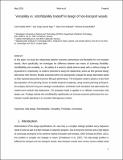Versatility vs. retrofittability tradeoff in design of non-transport vessels
Author(s)
Rehn, Carl Fredrik; Garcia Agis, Jose Jorge; Erikstad, Stein Ove; de Neufville, Richard L
DownloadSubmitted version (621.3Kb)
Terms of use
Metadata
Show full item recordAbstract
In this paper, we study the relationship between economic performance and flexibility for non-transport vessels. More specifically, we investigate the difference between two means of achieving flexibility: retrofittability and versatility, i.e., the ability of a vessel to satisfy diverse needs with or without change of physical form, respectively. A model is presented to study this relationship, where we first generate design alternatives with relevant, flexible properties before we subsequently evaluate the design alternatives based on their expected discounted economic lifecycle performance. The evaluation model is based on a two-level decomposition of the planning horizon to handle temporal complexity, using scenario planning and Epoch-Era analysis (EEA) for long-term strategic considerations, and Monte Carlo simulation and optimization for medium-term tactical ship deployment. The proposed model is applied to an offshore construction ship design case. Findings indicate that retrofittability can increase economic performance significantly for non-transport vessels operating in an uncertain heterogeneous context. Keyword: Ship design; Retrofittability; Versatility; Flexibility; Uncertainty
Date issued
2018-11Department
Massachusetts Institute of Technology. Institute for Data, Systems, and SocietyJournal
Ocean Engineering
Publisher
Elsevier Science
Citation
Rehn, Carl Fredrik et al. "Versatility vs. retrofittability tradeoff in design of non-transport vessels." Ocean Engineering 167 (November 2018): 229-238 © 2018 Elsevier Ltd.
Version: Original manuscript
ISSN
0029-8018